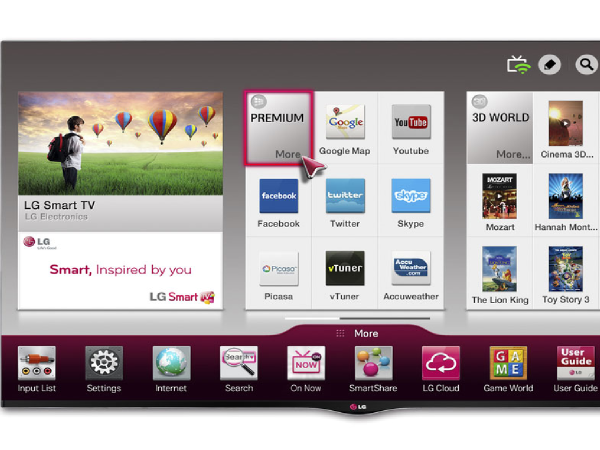LG TVs Demand Private Data in Exchange for 'Smart' Apps
If UK and EU LG TV owners don't agree to monitoring under a new Terms of Use agreement, they might not be able to access Smart TV apps.
Here at Tom’s Guide our expert editors are committed to bringing you the best news, reviews and guides to help you stay informed and ahead of the curve!
You are now subscribed
Your newsletter sign-up was successful
Want to add more newsletters?

Daily (Mon-Sun)
Tom's Guide Daily
Sign up to get the latest updates on all of your favorite content! From cutting-edge tech news and the hottest streaming buzz to unbeatable deals on the best products and in-depth reviews, we’ve got you covered.

Weekly on Thursday
Tom's AI Guide
Be AI savvy with your weekly newsletter summing up all the biggest AI news you need to know. Plus, analysis from our AI editor and tips on how to use the latest AI tools!

Weekly on Friday
Tom's iGuide
Unlock the vast world of Apple news straight to your inbox. With coverage on everything from exciting product launches to essential software updates, this is your go-to source for the latest updates on all the best Apple content.

Weekly on Monday
Tom's Streaming Guide
Our weekly newsletter is expertly crafted to immerse you in the world of streaming. Stay updated on the latest releases and our top recommendations across your favorite streaming platforms.
Join the club
Get full access to premium articles, exclusive features and a growing list of member rewards.

If you don't agree to let your LG Smart TV gather data on you and sell it to marketers, then features such as Netflix and YouTube — the "smart" part of the Smart TV — may be disabled. That's apparently the gist of the new Terms of Use and Privacy Policy pushed out to certain LG TVs along with a recent firmware update, and at least one customer is not happy about it.
The changes to the service agreements were noticed by English blogger Jason Huntley, a.k.a. DoctorBeet. Huntley wrote on his blog earlier this month that he became aware of the new policies when he tried to access YouTube on his 10-month-old LG TV.
Huntley posted screenshots of pop-up windows that appeared on his TV, one of which notified him that "Your consent is necessary for us to provide the service. You may need to consent to more than one document to use the service."
MORE: Best TVs 2014
In November 2013, Huntley had discovered that his LG Smart TV was snooping on his home network, uploading his viewing history to LG's servers even after he had disabled the feature in the TV's settings. He noticed that the TV also uploaded the names of personal files stored on memory devices — such as USB sticks — attached to the TV.
LG released a software update that stopped the earlier collection of viewing data. But the more recent software update, apparently dated Jan. 25 according to a transcription of the Privacy Policy that Huntley made himself and posted as a PDF on Google Docs, makes LG's monitoring practices explicit.
The new agreement implies that at least some of the "smart" features that customers paid for when they purchased their Smart TVs may be disabled if the customers do not consent to the collection of their data.
Get instant access to breaking news, the hottest reviews, great deals and helpful tips.
"You do not have to agree to the Privacy Policy," the document states, "but if you do not, not all Smart TV Services will be available to you."
Customers are asked to consent to collection of "viewing information," such as "the name of the channel or program watched, requests to view content, the terms you use to search for content, details of actions taken while viewing (e.g., play, stop, pause, etc.), the duration that content was watched, input method (RF, Component, HDMI) and search queries."
The agreement also covers "basic usage information," such as "information regarding external devices connected to the Smart TV" and "voice information" including "voice commands and associated data." The agreement adds that "if your spoken word includes personal or other sensitive information, such information will be among the Voice Information captured through your use of voice recognition features."
Huntley did not post a transcript of the Terms of Use agreement, but a reader of his blog posted a link to several pages on a British LG website containing the agreement.
On that website, the "Viewing Information" page states that, "this consent agreement describes what Viewing Information we may obtain from your Smart TV and how we use such information. Unless you consent, you will not be able to access certain Smart TV Services, such as viewing recommendations, searching functionality, our interactive 'Live Plus' service, and our 3D World video-streaming service."
The documents do not make clear how third-party apps would be affected by a customer's refusal to accept the Terms of Use and Privacy Policy, but they do state that "we do not accept any responsibility for apps, services or content provided by third-party providers."
"Other services owned and operated by third parties, such as content providers like Netflix and YouTube," the Privacy Policy states, "are outside the scope of this Privacy Policy and have their own policies that apply to the collection, use, and sharing of information."
Customers are not required to agree to the Voice Information policy, and can disable it separately of the main Terms of Use/Privacy Policy required to use the TV. Still, if customers don't read through the entire agreement and then seek out the Voice Information policy separately, their voice data will apparently still be collected.
All of this information will be anonymized and used for targeted advertising, the agreements say.
MORE: Google Chromecast vs Roku Streaming Stick
These new Terms of Use and Privacy Policy agreements seem to affect LG customers in the United Kingdom and the European Union. It's not clear if American customers are or will be affected; the snooping Huntley discovered in November did not apply to North American LG models.
However, the Privacy Policy Huntley posted refers to a "zip code," a U.S.-specific term, as well as to a "postcode," used in other English-speaking countries. The Privacy Policy also seems to comply with the U.S. Children's Online Privacy Protection Act of 1998 by stating that LG will not deliberately collect information from persons under age 13, and will delete any such information that it does collect.
Inquiries seeking comment from LG were not immediately returned.
Email jscharr@tomsguide.com or follow her @JillScharr and Google+. Follow us@TomsGuide, on Facebook and on Google+.
Jill Scharr is a creative writer and narrative designer in the videogame industry. She's currently Project Lead Writer at the games studio Harebrained Schemes, and has also worked at Bungie. Prior to that she worked as a Staff Writer for Tom's Guide, covering video games, online security, 3D printing and tech innovation among many subjects.
-
jldevoy LG are a bunch of shysters, they removed basically all the useful smart features of my TV 1 by 1, to force an upgrade; I will never buy another smart TV, next time it will be a smart box addon.Reply -
p75 Buy anything smart is really a dumb thing to do. Smart = spying on you. Boycott LG if they are going to treat their customers like that.Reply -
cats_Paw Im just buying "Dumb" tvs and connecting them to my PC with a TV tuner card... And I can get as smart as a PC allows.Reply
Ill never understand why people want apps in tvs... or in phones for the matter.
I guess im getting old but for me a phone is for calling... Sure a camera to capture a moment might have some usefullness but other stuff?
I remmber this once that I was with a co-worker at a bar in spain, and He picks out his phone, checks the weather for that day, and goes: "Oh, its gonna rain today".
Im sitting in front of him with a raincoat and im thinking "Good you check that after you leave home, and have no way to change the outcome of the situation".
Sometimes I feel like humans are getting dummer in my generation...
 Club Benefits
Club Benefits










